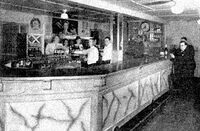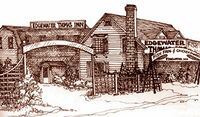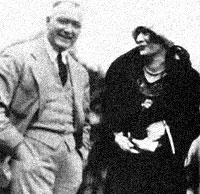Difference between revisions of "The Rendezvous, television series pitch/Episode loglines"
| Line 9: | Line 9: | ||
== Work in progress == | == Work in progress == | ||
| − | Rather than directly adapt [[The Rendezvous screenplay|''The Rendezvous'' screenplay]], an unpublished feature screenplay by [[Jason Carswell]], after many years of not looking at my script or copious notes I'm going to first outline (and maybe draft a treatment of) the story from memory to see what new gems may turn up before polishing. | + | Rather than directly adapt [[The Rendezvous screenplay|''The Rendezvous'' screenplay]], an unpublished feature screenplay by [[Jason Carswell]], after many years of not looking at my script or copious notes I'm going to first outline (and maybe draft a treatment of) the story, in part from memory and in part to fit this format, to see what new gems may turn up before polishing. |
At present, 12 or 13 episodes of about 10 minutes each (plus credits), would add up to 120 to 130 minutes - like a movie, but not. | At present, 12 or 13 episodes of about 10 minutes each (plus credits), would add up to 120 to 130 minutes - like a movie, but not. | ||
| Line 16: | Line 16: | ||
== Episode 1 - ''[[He's sinking!]]'' (1922) == | == Episode 1 - ''[[He's sinking!]]'' (1922) == | ||
| − | From the blustery winter outdoors | + | From the blustery winter outdoors, boys burst into The Rendezvous roadhouse tavern with alarming news. |
| − | Venturing out onto the frozen | + | Venturing out onto the frozen Lake St. Clair, the men and boys find a stuck old jalopy weighed down with whisky perilously in danger of plunging into the frozen depths. |
| − | Despite several attempts with different ideas, the subtle and not-subtle | + | Despite several attempts with different ideas, the subtle and not-so-subtle racist men in various states of sobriety finally free the vehicle to continue its smugglers' journey - thanks to the clever logical ideas of Cliff, the Black employee of The Rendezvous. |
== Episode 2 - ''[[Packing for war]]'' (1943) == | == Episode 2 - ''[[Packing for war]]'' (1943) == | ||
| Line 34: | Line 34: | ||
=== ''Wall hole'' (1922) === | === ''Wall hole'' (1922) === | ||
| − | At home Cliff's wife incessantly challenges his manhood for failing to better stand up to the racists and get a pay raise. | + | At home Cliff's wife, Rose, incessantly challenges his manhood for failing to better stand up to the racists and get a pay raise. |
| + | |||
| + | "Why did I even tell you..." Tensions rise. | ||
| + | |||
| + | She clips him with a cast iron pan and his response begins by smashing her head that creates a large hole in the kitchen wall as their children witness in horror. | ||
| + | |||
| + | Ruby, the girl and Clay, the boy... | ||
=== ''Dish smash'' (1943) === | === ''Dish smash'' (1943) === | ||
| + | |||
| + | Clay, the man... | ||
* - | * - | ||
| + | |||
| + | Clay, the man... | ||
=== ''I won't'' (1967) === | === ''I won't'' (1967) === | ||
| + | |||
| + | Clay, the old man... | ||
* - | * - | ||
| Line 173: | Line 185: | ||
* [https://en.wikipedia.org/wiki/Detroit_Renaissance Detroit Renaissance] | * [https://en.wikipedia.org/wiki/Detroit_Renaissance Detroit Renaissance] | ||
| − | ** [https://en.wikipedia.org/wiki/Renaissance_Center Renaissance Center], 1973-1977+ | + | ** [https://en.wikipedia.org/wiki/Renaissance_Center Renaissance Center], 1973 - 1977+ |
| + | |||
| + | * [https://en.wikipedia.org/wiki/Civil_rights_movement Civil rights movement], 1954 - 1968 | ||
| + | ** [https://en.wikipedia.org/wiki/Civil_rights_movement_in_popular_culture Civil rights movement in popular culture] | ||
| + | ** [https://en.wikipedia.org/wiki/List_of_civil_rights_leaders List of civil rights leaders] | ||
| + | *** [https://en.wikipedia.org/wiki/Malcolm_X Malcolm X], 1925 - 1965-02-21 | ||
| + | *** [https://en.wikipedia.org/wiki/Martin_Luther_King_Jr. Martin Luther King Jr.], 1929 - 1968-04-04 | ||
| + | ** [https://en.wikipedia.org/wiki/List_of_peace_activists List of peace activists] | ||
| + | *** [https://en.wikipedia.org/wiki/Violence_begets_violence Violence begets violence] | ||
* [https://en.wikipedia.org/wiki/The_Supremes The Supremes] | * [https://en.wikipedia.org/wiki/The_Supremes The Supremes] | ||
Revision as of 13:21, 21 July 2024
A logline (aka elevator pitch) is a one or two line plot summary.
Work in progress
Rather than directly adapt The Rendezvous screenplay, an unpublished feature screenplay by Jason Carswell, after many years of not looking at my script or copious notes I'm going to first outline (and maybe draft a treatment of) the story, in part from memory and in part to fit this format, to see what new gems may turn up before polishing.
At present, 12 or 13 episodes of about 10 minutes each (plus credits), would add up to 120 to 130 minutes - like a movie, but not.
Episode 1 - He's sinking! (1922)
From the blustery winter outdoors, boys burst into The Rendezvous roadhouse tavern with alarming news.
Venturing out onto the frozen Lake St. Clair, the men and boys find a stuck old jalopy weighed down with whisky perilously in danger of plunging into the frozen depths.
Despite several attempts with different ideas, the subtle and not-so-subtle racist men in various states of sobriety finally free the vehicle to continue its smugglers' journey - thanks to the clever logical ideas of Cliff, the Black employee of The Rendezvous.
Episode 2 - Packing for war (1943)
- -
Episode 3 - Auto grind (1967)
- -
Episode 4 - Shut up! (1922, 1943, 1967)
Wall hole (1922)
At home Cliff's wife, Rose, incessantly challenges his manhood for failing to better stand up to the racists and get a pay raise.
"Why did I even tell you..." Tensions rise.
She clips him with a cast iron pan and his response begins by smashing her head that creates a large hole in the kitchen wall as their children witness in horror.
Ruby, the girl and Clay, the boy...
Dish smash (1943)
Clay, the man...
- -
Clay, the man...
I won't (1967)
Clay, the old man...
- -
Episode 5 - Ain't misbehavin' (1922)
Touring musician Fats Waller is tickling the ivories at the Rendezvous as patrons drink - until the boys come down from the upstairs lookout to announce the arrival of police.
Everyone pitches in to clean up after the entire bar rotates to hide in the wall.
Fats starts adlibbing what would become one of his famous tunes, as the police enter asking questions but are only rewarded with fries, like the boys, plus a subtle bribe.
Episode 6 - Having a riot (1943)
- -
Episode 7 - Seeds of discontent (1967)
- -
Episode 8 - Roadhouse taverns (1922, 1943, 1967)
Wire light
- -
Patriarch ache
- -
Supremes
- -
Episode 9 - Family tree
- Optional 1800s bonus episode.
- -
Episode 10 - Tanks in Detroit (1967)
- -
Episode 11 - Father's funeral (1943)
- -
Episode 12 - Gangsters rendezvous (1922)
- -
Episode 13 - Wealth of generations (1922, 1943, 1967)
Walk and patch
- -
Real riches
- -
Diamonds!
- -
Reference
Wikipedia links, unless otherwise noted:
1922
- Ain't Misbehavin' (song)
- "Ain't Misbehavin'" is a 1929 stride jazz/early swing song. Andy Razaf wrote the lyrics to a score by Thomas "Fats" Waller and Harry Brooks for the Broadway musical comedy play Connie's Hot Chocolates (opened June 20, 1929). As a work from 1929 with its copyright renewed, it will enter the American public domain on January 1, 2025.
- Boardwalk Empire, an HBO television series, 2010-2014
- Riverside, Ontario#Historical and the Grand Taverns of Riverside:
- Edgewater Thomas Inn
- Island View Tavern (known as Abars)
- Lauzon Stop House
- Menard's Tavern
- Rendezvous Tavern
- Wolf's Hotel
- Pub#Roadhouse
- Speakeasy, aka blind pig or blind tiger
1943
- 1943 Detroit race riot, Sunday June 20 - Tuesday June 22, 1943
- Belle Isle Park
- MacArthur Bridge (Detroit), 1923+, replaced an iron bridge with wooden decking that accidentally caught fire and was destroyed in 1915. The bridge, popularly known as the Belle Isle Bridge, was originally named the George Washington Bridge and renamed the Douglas MacArthur Bridge after General Douglas MacArthur in 1942.
- Detroit Diesel Series 71, 1938–1995
- Harry Houdini#Death, (1874 - Halloween 1926)
- Naval Air Station Grosse Ile, 1929 - 1969
1967
- 1967 Detroit riot, Sunday July 23, 1967 - Thursay July 27, 1967, aka The 12th Street Riot
- "Black Day in July" – 4:10 - Side 1, Track 3 on the album: Did She Mention My Name?
- By Gordon Lightfoot on YouTube
- Covered by The Tragically Hip on YouTube
- "Black Day in July" – 4:10 - Side 1, Track 3 on the album: Did She Mention My Name?
- Detroit Renaissance
- Renaissance Center, 1973 - 1977+
- Civil rights movement, 1954 - 1968
- Civil rights movement in popular culture
- List of civil rights leaders
- Malcolm X, 1925 - 1965-02-21
- Martin Luther King Jr., 1929 - 1968-04-04
- List of peace activists
- Detroit dramas
- Detroit history
- Filmmaking
- Historical drama
- Independent media
- Loglines
- Media alternatives
- Media ideas
- Media projects
- Original content
- Pitches
- Production development
- Projects started on 2023-03-06
- Stories set in the 1920s
- Stories set in the 1940s
- Stories set in the 1960s
- Television
- Television series pitches
- The Rendezvous
- The Rendezvous, television series pitch
- Windsor communications
- Windsor dramas
- Windsor dramatic productions
- Windsor entertainment
- Windsor history
- Windsor indie-media
- Windsor media
- Windsor prepper projects
- Windsor video productions
- Windsor videos




